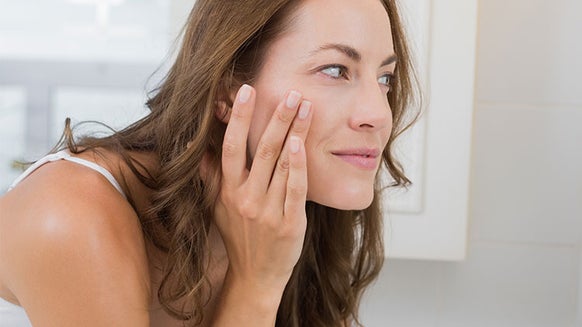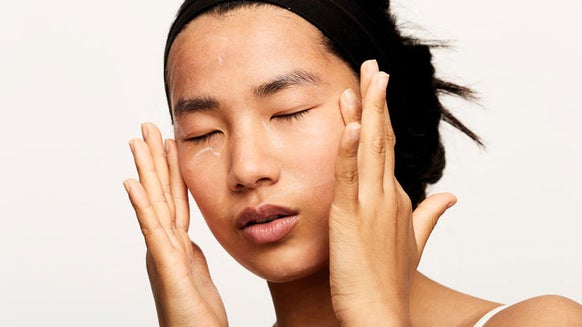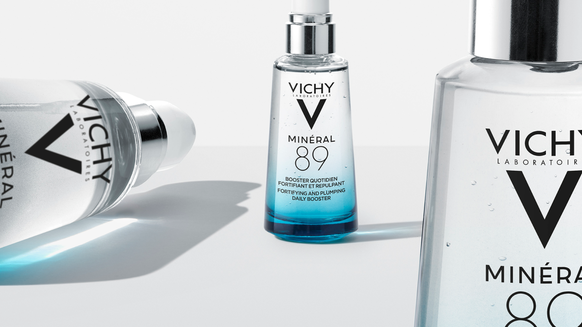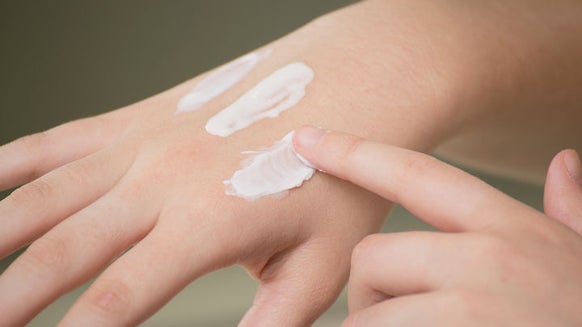How Your Hormones Affect Your Skin Before, During and After Your Period
If you’re like most people, your skin probably has good days and not-so-good ones—but why? Sure, factors like stress, the foods you eat and the products in your regimen all make a difference. But your hormones also play a major role. No one knows this better than board-certified obstetrician and gynecologist
Each day of the menstrual cycle is a reflection of different levels of the “big three” hormones: estrogen, progesterone and testosterone. Not only are women designed to have these levels fluctuate, but their relationship varies each day as well, influencing how you look and feel. The key is to understand why they fluctuate and what we can do to take charge of these variations.
Days 1–7: Menstruation, the “Reset” of the Cycle
Cycle day 1 is the first day of the period, and the three major female hormones (estrogen, progesterone, testosterone) are all low on this day. Estrogen and testosterone slowly begin to rise most notably by cycle day three.
How do your hormones affect the way you look and feel this week?
The big three reproductive hormones support mood and metabolism and impact your skin. Estrogen’s low point on days 1–3 of the cycle leads to less stimulation of collagen, elastin and hyaluronic acid—that dewy substance that gives skin its glow.
How should you adjust your regimen?
Use a moisturizer rich in phytoestrogens, plant-based estrogens found in the nuts, seeds and bark of the healthiest plants. These ingredients safely and effectively mimic estrogen’s effect on skin, improving elasticity, clarity and luminosity. Don’t skimp on cleansing, exfoliating and moisturizing your skin during this week. - Increase your consumption of plant protein, especially in the morning, including nuts, nut butters, chickpeas (hummus) or edamame.
- Drink more water. Skin needs water to maintain elasticity, so drink up and avoid excess caffeine, which can dehydrate the body, causing dullness in skin.
- Definitely avoid sugar and simple carbs in this part of the cycle—it will make estrogen-deprived skin even more susceptible to blemishes and acne.
Days 8–15: “The Venus Week”
The week following your period, estrogen and testosterone are climbing together toward a perfect crescendo just prior to ovulation, around days 14–15. I call this grouping of days the Venus Week, as the hormonal recipe is designed to make you look and feel your best.
How do your hormones affect the way you look and feel this week?
The dynamic duo of the power hormones, estrogen and testosterone, increase romantic and positive thinking, as well as confidence and desire. This is enhanced by an increase in dopamine and endorphins to stimulate mood and energy. Verbal acuity is enhanced, metabolism is more efficient, and skin has a glow.
How should you adjust your regimen?
- Less is more in terms of makeup during this week. Let your nature-enhanced beauty shine through.
- To keep your skin glowing, keep your sugar and carb intake to a minimum (although if you are going to “cheat,” this is the only week in the cycle where you might get away with it from a skin standpoint).
- Don’t slack off on good skin care. When skin is at its best, a good regimen will help prolong it!
Days 16–28: Progesterone Dominance, the “Minerva Phase”
Just after ovulation, estrogen and testosterone take a dip as progesterone, the hormone Mother Nature sends out to protect the assumed pregnancy, takes charge (even if you’re not pregnant). Progesterone’s job is to encourage rest and eating, hence energy goes down and appetite goes up! The mood can be a little more inwardly directed, a time for focusing on individual goals and increasing meditation and organization.
How do your hormones affect the way you look and feel this week?
The gentle fall of estrogen and testosterone after ovulation can be a letdown for many. As progesterone rises, it makes metabolism a little sluggish, resulting in more bloating, a tendency to gain weight. As the cycle progresses, even progesterone begins to fall, and the mood takes even more of a dive as in response to the “Big Three” dropping. Since the hormones support feel-good brain chemicals, the sudden drop causes dopamine, endorphins, and serotonin to all fall as well. This also is the prime time for skin disruption.
How should you adjust your regimen?
- The best solution for a sluggish mood and sluggish metabolism is exercise, at least 22 minutes every day (2.5 hours a week) and meditation!
- Take extra care to prevent skin problems in the week leading up to your period, which is the time you’re most likely to experience breakouts and dullness in your skin. If you are prone to blemishes, incorporate a cleanser with willow bark into your regimen to help keep spots at bay. A calming mask can help soothe and improve the clarity of skin as a rinse-off treatment, or on spots or blemishes overnight.
Navigating the cycle is a challenge women face from our teens into our 50s. By understanding the hormonal shifts underlying each phase, you can anticipate and adjust to optimize your mood, metabolism and skin.

From the latest hair and makeup trends to the best solutions for your skin issues, we've got all your beauty concerns covered!







